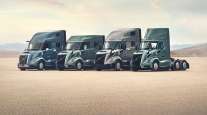Staff Reporter
Volvo Trucks’ Peter Voorhoeve Sees Opportunity to Accelerate Zero-Emission Goals

[Stay on top of transportation news: Get TTNews in your inbox.]
DUBLIN, Va. — The time is now to accelerate the shift to zero-emission vehicles despite red flags in the market, Volvo Trucks North America CEO Peter Voorhoeve said Sept. 29.
Voorhoeve shared his thoughts during the Volvo Trucks Electromobility Sales Summit. He believes strong truck sales demand and a desire for sustainable transportation solutions will overcome potential economic downturns in the year ahead. Volvo Trucks is aiming to completely eliminate its CO2 emissions by 2040.
“This is looking at the market, looking at customer satisfaction, looking at sustainability, looking at your whole sales setup,” Voorhoeve said. “Now we come to the main point of today. I think our focus on sustainability, it connects. People find this to be important, and we’re at the market early. We started early. We’re a little bit faster than most. Then let’s talk about accelerating the shift to zero emissions.”
Voorhoeve noted that despite disruptions in the past few years his company still managed to gain market share. He added that normally wouldn’t happen given economic conditions. Voorhoeve believes that will continue to be true with a focus on sustainability and customer satisfaction.

Voorhoeve
“So that’s the feel of the market that we have,” Voorhoeve said. “A lot of red signals, a lot of alarm bells, but we believe that we’re going into another strong year, and we have to prepare the supply chain to weather that storm. That’s why I believe we’re doing pretty good. Better than what we’d normally do. But we have to stick to our key priorities regardless of good economy or bad economy. For me, No. 1 is always customer satisfaction.”
Voorhoeve sees the truck sales market remaining strong because of several factors, including pent-up demand. He noted that demand could normalize somewhat, but that would help alleviate some pressure. Either way, he doesn’t see demand falling.
“What that means for us is we have to prepare carefully for what is happening in the industry, whether that be our production, our sales, our capacity, etc.,” Voorhoeve said. “And how is this new truck market reacting to this, because normally when we go into a downturn, the transport industry related to the truck manufacturers is affected often in the early stages. But if you look at the truck market right now, we see that we are actually lagging behind a little bit.”
I’ve driven my first Class 8 truck. The VNR Electric truck for a couple laps around a test track. Thank you @VolvoTrucks for the experience. — Connor D. Wolf (@ConnorInTheNews) September 29, 2022
Volvo estimates that this year will have a backlog of 270,000 to 275,000 trucks compared with 248,000 the prior year. The company projected that 2023 could outpace this year, meaning demand should be fairly well shielded from an economic downturn or normalization.
“We don’t see a big slope down,” Voorhoeve said. “I think the recession will begin somewhere in 2023 or something like that. But many of the truck buyers today, of course, they need trucks for transport. Many of them need to buy trucks because they’re behind their replacement cycle. The trucks are getting older, maintenance going up, that has an impact on profitability, so they have to order just to get their maintenance cost under control.”

A Volvo VNR truck on display at the company's New River Valley plant in Dublin, Va. (Connor D. Wolf/Transport Topics)
Voorhoeve has heard from fleet customers that sustainability is important, and much of that is driven by focusing on reducing emissions within their operations. Because of that, he believes combining customer satisfaction with technology and a focus on sustainability ultimately will mean market share improvements.
“Larger companies are making statements now like us saying we want to cut our CO2 emissions by half by 2030 or 2035,” Voorhoeve said. “So, it’s really growing now. And it’s about coming up with something they can actually use.”
Volvo has taken a broad and detailed approach to help fleets transition to battery-electric trucks. A major piece is growing the network of electric truck certified dealerships. This is met by payment and maintenance assistance to help fleets navigate the hurdles of transitioning. It also means focusing on technology development beyond just battery-electric to increase efficiencies wherever possible.

An inside view of a Volvo VNL 760 sleeper cab. (Connor D. Wolf/Transport Topics)
“We don’t want to do it with only electric vehicles,” Voorhoeve said. “We have a three-pronged approach. We’ll still have combustion engines, there will be battery-electric vehicles and there will be fuel cell-electric as well. Those three will live together, so to speak.”
Voorhoeve sees battery-electric vehicles in the near term being used for local and regional distribution. Fuel cell-electric promises to have a longer range, but that technology still is maturing. He also suspects internal combustion engines will be around for instances when electric isn’t viable.
Want more news? Listen to today's daily briefing below or go here for more info:




